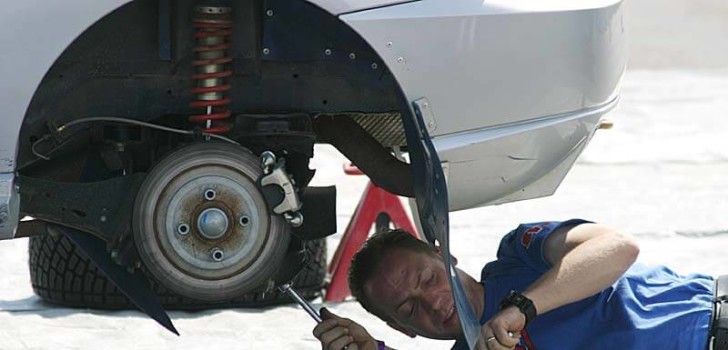The concept of ownership is at risk of disappearing in America. From music to software to fonts the trend is toward the average American becoming a mere limited rights licensee despite our proud history of ownership.
Turns out the folks who make your truck aren’t much different. Autoblog reports that automakers are quietly supporting provisions in copyright law that could prohibit home mechanics and car enthusiasts from repairing and modifying their own vehicles. ‘Own’ being a relative term here as automakers would like you to be nothing more than a user but yet would still like to charge you full price of ownership.
In comments filed with a federal agency that will determine whether repairing a car constitutes a copyright violation, vehicle manufacturers and their main lobbying organization say cars have become too ‘complex’ and ‘dangerous’ for consumers and third parties to handle.
Allowing consumer like you and I to continue to fix their cars has become “legally problematic,” according to a written statement from the Auto Alliance, the main lobbying arm of automakers. Very convenient it would seem.
The dispute arises from a section of the Digital Millennium Copyright Act that was clearly not intended to apply to car manufacturers. But now, in an era of frivolous lawsuits and cars that contain computing platforms, the U.S. Copyright Office is examining whether provisions of the law that protect intellectual property should prohibit people from owning their cars.
Every three years, the office holds hearings to determine whether certain activities should be exempt from the DMCA’s section 1201, which governs technological measures that protect copyrighted work. The Electronic Frontier Foundation (EFF), a nonprofit organization that advocates for individual rights in the digital world, has asked the office to ensure that home mechanics can continue working on cars by providing exemptions that would give them the right to access necessary car components.
Interested parties have until the end of the month to file comments on the proposed rule making, and a final decision is expected by mid-year.
The outcome will be monumental for the concept of ownership as item we’ve traditionally owned – fridges, stoves, televisions, thermostats, computers and vehicles – become wired to the internet.
In comments submitted so far, automakers have aggressively tried to paint the picture that allowing outsiders to access electronic control units that run critical vehicle functions like steering, throttle and braking “leads to an imbalance by which the negative consequences far outweigh any suggested benefits,” according to the Alliance of Global Automakers. In the worst cases, the organizations said an exemption for home mechanics”leads to disastrous consequences.”
We must be careful to dig a little deeper and understand what is at stake – the very concept of ownership. If adding technology to mundane products means removing the concept of ownership, perhaps our legal system needs to take a long hard look at the law. And perhaps consumers need to take a long hard look at their vehicles manufacturers to separate fact from fiction.
“It’s not a new thing to be able to repair and modify cars,” said Kit Walsh, a staff attorney with the Electronic Frontier Foundation. “It’s actually a new thing to keep people from doing it. There are these specialized agencies that govern what vehicles can lawfully be used for on the road, and they have not seen fit to stop them from repairing cars.”
Aftermarket suppliers and home mechanics have been modifying ECUs for years without dire consequences. By tweaking the ECU codes, a process sometimes known as “chipping,” they’ve boosted horsepower, improved fuel efficiency, established performance limits for teen drivers and enhanced countless other features of the products they own and have paid for. These innovations have contributed to a “decades-old tradition of mechanical curiosity and self-reliance,” according to the EFF.
The EFF thinks the industry’s desire to block exemptions has more to do with profits than safety and we’d agree. As software becomes easier to update via the internet and wireless networks, automakers could charge for these performance upgrades on an a la carte basis. Because a favorable ruling would strengthen their control of the software, the car companies could potentially force consumers to only have their vehicles fixed at their dealerships or preferred repair shops – a fatal blow to the concept of ownership.
In this dystopian world buying a house would be nothing more than being a renter – your builder would own all the software of your HVAC system, your lighting system, your automated window covering system and your electrical system. Want to add an outlet? Pay a licensing fee for one more plug.
Another question central to balancing the competing interests in the proposed exemptions: Once customers purchase a device, must they only use it specifically as the manufacturer intended or can they modify it for their own particular needs?
Another key issue is the ability of outside parties to audit the security of vehicle systems. In that respect, cyber-security security researchers might enhance vehicle safety more than the occasional amateur error may cause harm. All the more reason, then, that automakers and independents should be considered on equal footing.
“It’s just a myth that the manufacturers are the only people who can make improvements,” an industry expert said. “That’s why maintaining that choice is really important.”
Stay Connected